Ever notice how some people seem to get more done by lunch than others do all day? Their secret lies in powerful morning habits for success. Best-selling author Robin Sharma shares in “The 5 AM Club” how top CEOs, writers, and athletes start their day at 5 AM. These quiet hours are special. No phones ringing. No emails coming in. No one asking for their time.
But you don’t need to be a CEO to reach peak achievement through morning routines. Small changes in how you start your day can lead to big wins in your life. Think of your 5 AM Club routines like building blocks. Each small habit helps you build a stronger, better day.
Many people say they can’t wake up early. They think it’s too hard. But with the right steps from The 5 AM Club, anyone can become a morning person. The key is to start slow and make it fun. When you wake up early, you give yourself a gift – time to focus on what matters most to you.
Why Wake Up at 5 AM?
The early morning has a special kind of magic. Your house is quiet. The world is still sleeping. You can think clearly without anyone asking for your attention. This quiet time lets you work on your dreams, take care of your health, and plan your day before life gets busy. Many people find they get more done between 5 AM and 8 AM than in the whole rest of their day.
14 Simple Morning Habits You Can Start Today
1. Wake Up The Right Way
Want to wake up at 5 AM? Start by setting up your room the night before. Put your alarm clock far from your bed, so you must get up to turn it off. Pick out your clothes and place them where you can see them.
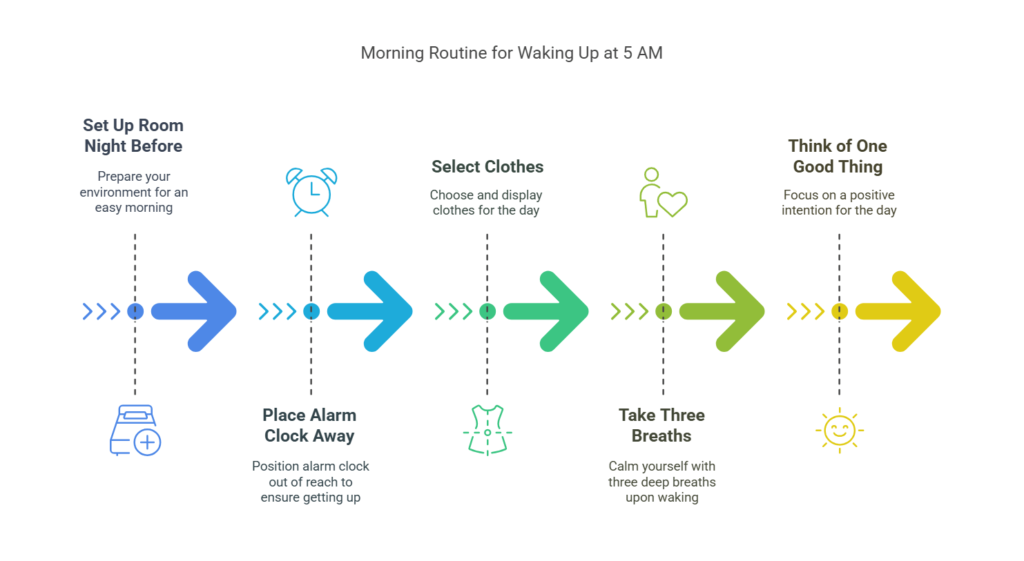
When the alarm rings, take three slow breaths and think of one good thing you want to do today. Many people who do this say they feel less tired and more ready to start their day.
2. Drink Your Water
Your body needs lots of water after sleep. Keep a big glass or water bottle (about two cups) by your bed each night. Drink it all when you wake up. If you want, add a fresh lemon slice or a bit of honey. Some people like warm water better than cold. After a week of doing this, you’ll notice more energy and clearer thinking in the morning.
3. Move Your Body
Start with easy moves for about 20 minutes each morning. You might take a quiet walk around your block or do some simple stretches in your room. Lift your arms up high, touch your toes, and twist side to side. If you’re new to morning exercise, begin with just 5 minutes and add one minute each day. Your body will feel lighter and more alive.
4. Sit In Peace
Find a comfy, quiet spot where no one will bother you. Set a timer for 10 minutes. Focus on how your breath feels going in and out. When thoughts pop up, just let them float away like clouds. Don’t worry if your mind wanders – that’s normal. Just gently bring your focus back to your breath. Many people find this makes their whole day calmer.
5. Write What Makes You Happy
Keep a special notebook just for good things. Each morning, write down three things that make you smile. They don’t need to be big things. Maybe you heard a nice song, saw a pretty sunset, or got a good text from a friend. Writing these down helps you notice more good things all day long. Read old entries when you feel down.
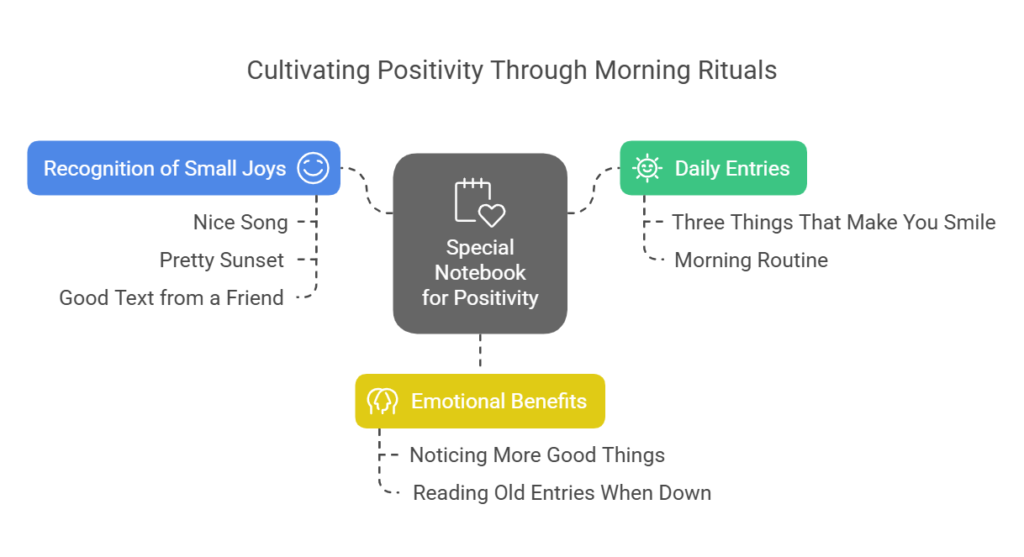
6. Look At Your Goals
Make a small card with your big dreams written on it. Each morning, read these goals out loud. Think about one tiny step you can take today to get closer to them. Your goals might be about your job, your health, or things you want to learn. Keep this card where you’ll see it often. This helps you stay focused on what matters most.
7. Learn One New Thing
Use 20 minutes to feed your brain. You could read a few pages of a good book, listen to a short lesson, or learn a new word or fact. Pick topics that help you grow or that you find fun. Your mind is fresh in the morning, so this is the best time to learn. Write down what you learn in a special notebook.
8. Make Something New
Spend 15 minutes being creative each morning. You might write a story, draw a picture, or think up new ideas for work. Don’t try to make things perfect – just let your mind play freely. Morning is when most people have their best ideas. Keep a notebook handy to catch all your good thoughts.
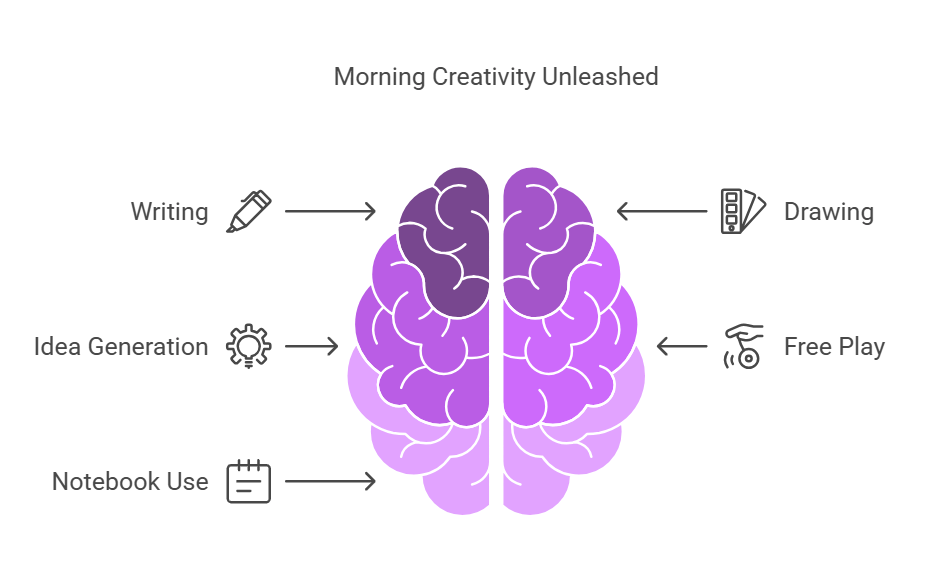
9. Plan Your Day
Take 10 minutes to map out your day. Write down the three most important things you must do. Put the hardest task first, when your energy is high. Break big jobs into smaller, easier steps. Leave some free time for surprise tasks that might come up. This helps you stay on top of your work.
10. Eat Good Food
Make a breakfast that will keep you strong until lunch. Try eggs with whole grain toast, or oats with fruit and nuts. Add protein to help you feel full longer. Skip sugary foods that make you crash later. Drink green tea or plain water instead of sweet drinks. A good breakfast helps you think better and work harder.
11. Say Hi To Someone
Take five minutes to connect with people you care about. Send a nice text to an old friend, write a quick thank you note, or call someone in your family. Even a simple “good morning” can make someone’s day better. This puts good feelings into the world and makes you feel better too. Keep a list of people you want to stay in touch with.
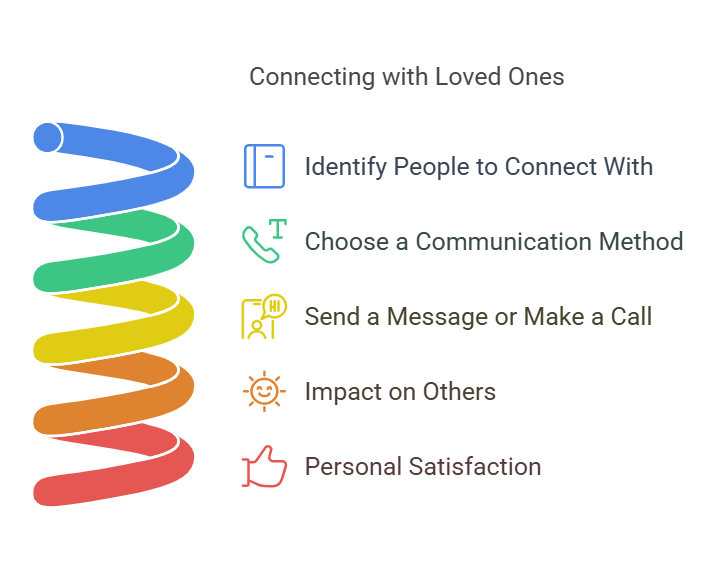
12. Make Your Space Nice
Create a morning spot that makes you feel good. Open your windows to let in fresh air. Play calm music if you like it. Keep this space clean and organized. Put up photos that make you happy. Some people like to add plants or use nice smells like coffee or mint. Your space can help you feel more peaceful or more energetic.
13. Get Ready For Work
Look over your work schedule for the day. Check when your meetings are and what you need for them. Get your work bag, papers, and other items ready. Picture yourself doing well at your tasks. This helps you feel more sure of yourself and ready to handle any challenges that come up.
14. Do One Small Task
Pick one quick job that you can finish in 15 minutes or less. It might be cleaning off your desk, sending an important email, or making a phone call you’ve been putting off. Doing one small task early gives you a feeling of success. This good feeling often lasts all day and helps you get more done.
Main Things to Remember
- Start small. Try one new habit at a time.
- Get ready the night before.
- Be easy on yourself. No one is perfect.
- Keep going. Small steps add up.
- Make these habits fit your life.
Key Takeaways for Success
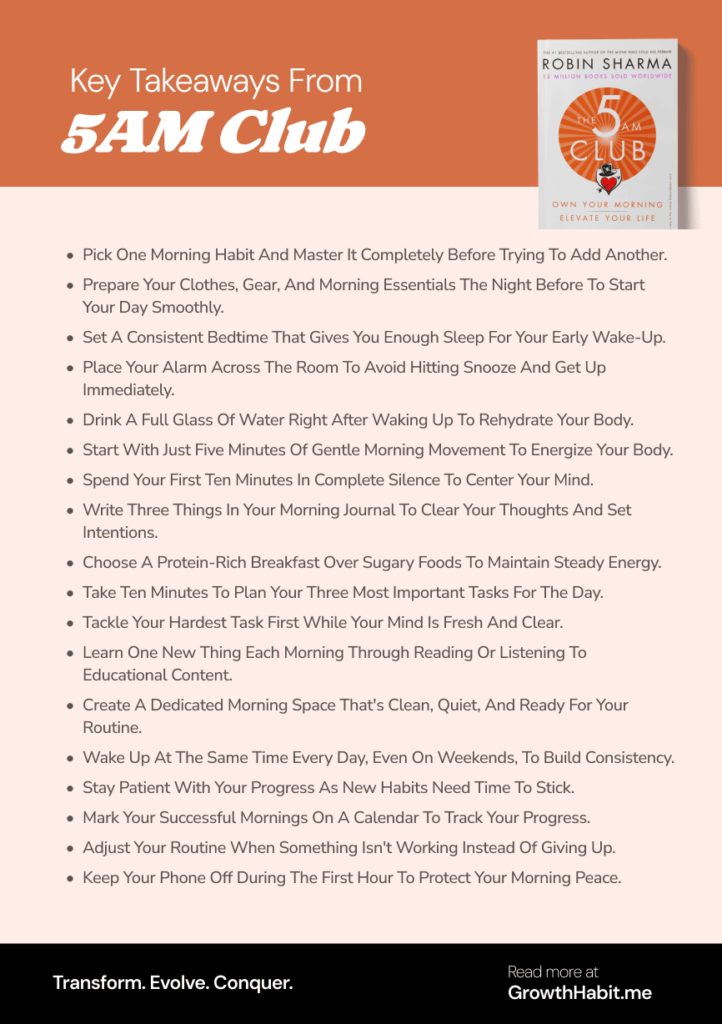
- Consistency is crucial: Start with small changes and build up gradually to establish sustainable habits.
- Preparation matters: Your morning success begins the night before with proper planning and preparation.
- Flexibility works: Adapt these routines to fit your lifestyle while maintaining the core principles of early rising and intentional activity.
- Progress over perfection: Focus on continuous improvement rather than getting everything perfect from day one.
- Personal adaptation: Customize these routines to match your goals, energy levels, and circumstances.
Making These Routines Work for You
Remember that establishing new habits takes time. Start by implementing one or two routines that resonate most with you. Once these become natural, add more gradually. The goal isn’t to follow every routine perfectly but to create a morning practice that energizes and empowers you.
Consider tracking your progress in a journal or app. Note how different routines affect your energy, productivity, and mood. This helps you refine your morning practice for optimal results.
Conclusion
Start with just one new habit tomorrow. Maybe it’s drinking water first thing, or taking a short walk. Once that feels easy, add another. Don’t try to change everything at once. Small steps lead to big changes over time.
Remember, the most successful morning routine is one that you can stick to. Make these habits work for your life. If you need to adjust them, that’s fine. The goal isn’t to be perfect – it’s to be a little better each day.
Think about how good it will feel to have quiet time for yourself each morning. Picture getting more done, feeling healthier, and being more focused. Your new morning starts with your next alarm. Set it now for 5 AM tomorrow.
Note: Listen to your body as you make these changes. Go at your own pace. Not everyone needs to wake up at exactly 5 AM – find the early morning time that works best for you.


